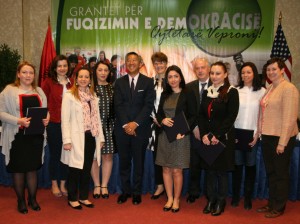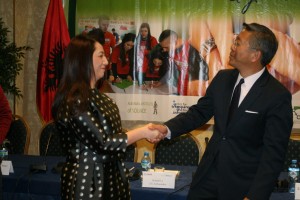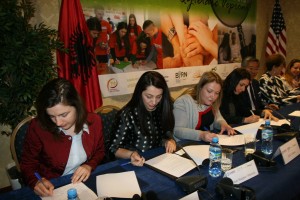USAID / Albania and Assist Impact are supporting eight civil society projects to empower democracy. In a special ceremony held on 16 of April, was the signing of grant support agreements. One of the wining projects was that of our organization, called: Money, Government and Politics. The Executive Director Ms, Aranita BRAHAJ signed the agreement on behalf of AIS. Through this project is aimed the promotion of transparency and civic reaction, release of data on the assets declared by senior officials and judges, as well data on assets and public expenditure.
The Ambassador of United States of America in Tirana Mr, Donald LU present at the ceremony emphasized the value of civil society groups in Democracy. In his welcoming speech Ambassador Lu stated that: “The Albanian Government, local governments and private businesses should understand the value of civil society groups and take responsibility to financially support and encourage them. Without a strong civil society, no democracy can be really successful”
Assist Impact is implementing a three-year project for USAID / Albania, entitled “Human and Institutional Capacity Building”. The project aims to support non-governmental organizations, governmental agencies and business associations, in improving their skills and work.
As part of this project, Assist Impact, through a competitive process, has selected eight organizations from all over Albania. The goal of the grant is to increase the participation in decision-making, the role of the community and the accountability of public officials.
 In the picture, the US Ambassador in Tirana Mr, Donald LU with grant beneficiaries.
In the picture, the US Ambassador in Tirana Mr, Donald LU with grant beneficiaries. In the picture, the Ambassador Donald LU and the Executive Director of AIS Ms, Aranita BRAHAJ during the grant ceremony.
In the picture, the Ambassador Donald LU and the Executive Director of AIS Ms, Aranita BRAHAJ during the grant ceremony. In the picture Ms, Aranita BRAHAJ signing the grant agreement.
In the picture Ms, Aranita BRAHAJ signing the grant agreement.
Dita Europiane e Pjesëmarrjes Elektronike / e-Participation Day, 7 Maj 2015
/in Events, Homeposts, Press Releases /by Besi HysaInstituti Shqiptar i Shkencave (AIS) , më datën 7 maj 2015 , ora 10,në ambjentet e Librarisë Tirana Times (pranë shkollës 11 Janari) , organizon një forum të hapur me të rinj, për Ditën Europiane të Pjesëmarrjes Elektronike /e-Participation Day. Ky event realizohet në kuadër të Programit eUROPA for Citizens në njëmbëdhjetë vende të Europës. AIS bëhet pjesë e këtij programi si partner i rrjetit Telecentre Europe, një rrjet organizatash me qendër në Bruksel, e fokusuar në çështje të edukimit dhe përfshirjes dixhitale të qytetarëve.
Programi i e-Participation Day:
Broshura është një publikim i përkthyer në dymbëdhjetë gjuhë evropiane, si dhe në gjuhën shqipe. Ajo përcjell informacion mbi instrumente që mundësojnë pjesëmarrjen qytetare për informim dhe reagim. Instrumenta të ndërtuara për të ndihmuar qytetarët të komunikojnë dhe të dëgjohen nga përfaqësuesit zgjedhur prej tyre
Instrumentat
Një prezantim i instrumenteve elektronik funksional në Bashkimin Europian si:
Konkursi.
Titulli i Konkursit është My e-Participation Story. Pjesëmarrësit duhet që brenda datës 31 korrik 2015, të shkruajnë dhe postojnë në formë elektronike një histori personale të ndodhur gjatë udhëtimit apo qëndrimit në një nga vendet e BE. Historia nuk duhet të përmbajë më shumë se 500 fjalë dhe duhet të rrëfejë një problematikë të hasur, nëpërmjet përdorimit të teknologjisë së informacionit. Pjesëmarrës mund të jetë çdo qytetar. Fituesi merr titullin “e-Participation Ambassador” për Shqipërinë , si dhe fiton të drejtën e një udhëtimi me qëllim prezantimin e ese-së së tij/saj në një event i cili do të mbahet në Bruksel në muajin Dhjetor.
USAID/Albania through Assist Impact supports AIS project: Money, Government & Politics
/in Events, Homeposts, Press Releases /by adminUSAID / Albania and Assist Impact are supporting eight civil society projects to empower democracy. In a special ceremony held on 16 of April, was the signing of grant support agreements. One of the wining projects was that of our organization, called: Money, Government and Politics. The Executive Director Ms, Aranita BRAHAJ signed the agreement on behalf of AIS. Through this project is aimed the promotion of transparency and civic reaction, release of data on the assets declared by senior officials and judges, as well data on assets and public expenditure.
The Ambassador of United States of America in Tirana Mr, Donald LU present at the ceremony emphasized the value of civil society groups in Democracy. In his welcoming speech Ambassador Lu stated that: “The Albanian Government, local governments and private businesses should understand the value of civil society groups and take responsibility to financially support and encourage them. Without a strong civil society, no democracy can be really successful”
Assist Impact is implementing a three-year project for USAID / Albania, entitled “Human and Institutional Capacity Building”. The project aims to support non-governmental organizations, governmental agencies and business associations, in improving their skills and work.
As part of this project, Assist Impact, through a competitive process, has selected eight organizations from all over Albania. The goal of the grant is to increase the participation in decision-making, the role of the community and the accountability of public officials.
AIS participated at Personal Democracy Forum for Central and Eastern Europe
/in Events, Homeposts, Press Releases /by Besi HysaAlbanian Institute of Science became part of one of the most important events in Europe dedicated to Technology for Democracy and Active Citizenship. Personal Democracy Forum took place in Poland between 16 and 17 of April.
The topic of this year My Country: Open, Digital, Civic, reflected the interest of exploring how society in different regions, are integrated into the digital age. States are under pressure by citizens for openness and transparency. The forum brought together representatives of non-governmental organizations, activists, public administration officials and journalists from more than twenty countries.
AIS team was represented by Besjana HYSA and Blerta TUCI. Blerta TUCI Project Coordinator of AIS was one of the main panel speakers and presented: Money, Government and Politics, a project for transparency, innovation and civic participation. The presentation prompted the interest of a wide audience with over two hundred participants from prestigious institutes in Europe and other continents.
Money, Government & Politics through the opening of data for decision makers, public transactions and concessions, was estimated as a model of inspiration for civil society in Central and Eastern Europe. Publications in Spending Data Albania were considered as consolidated cases of use of technology for Democracy and Civic Activism.
Presentation link: https://prezi.com/6ovttsbsob83/money-governments-and-politics/#
Video:
Photo:
Money&Power: Publishes data about the assets, incomes, and expenditures declared by high level officials in politics and judiciary.
/in Homeposts, Press Releases /by Besi HysaAt the portal Open Spending Albania on the section Money and Power (One Stop Integrated Data Source) publishes data about the assets, incomes, and expenditures declared by high level officials in politics and judiciary. Such data were either declared in a certain year or before the public official took office. In any case, the respective documents contain the date in which it was submitted to the High Inspectorate of Declaration of Assets in Albania (HIDAA). Such declarations are made not only by the public officials themselves, but also by their family members, who are subject to declaration in accordance with the national legislation. Annual declarations contain information about the incomes of the respective year, properties gained during the declaring year, and expenditures, which according to the law, should be declared. The high public officials subject to such declaration include: the President of the Republic, Members of the Council of Ministers, and Mayors of main Municipalities, Members of Parliament, high-level Judges, Chief Prosecutor, and directors of independent institutions. The information they declare is published and made transparent in order to inform the public about the economic interests and assets of the high public official, who represent and govern the country. The data published under Money & Power are interlinked with those published under the Open Corporates Albania on business companies declared by individuals. The data for each individual includes the index number of the reference document submitted to the High Inspectorate for the Declaration of Assets in Albania (HIDAAA).
AIS at WeLoveData event
/in Events, Homeposts /by Besi HysaOn 24-25 March 2015, UNDP Regional Bureau for Europe and the ECSI organized in Istanbul, Turkey an Open Data Workshop for NGOs in Euro-Asia called WeLoveData. The workshop was designed to address the needs and challenges that the growing open data community is facing in Europe and Central Asia. The workshop brought together 30 journalists, civic activists, and data analysts from over 15 countries across the region.
AIS /Open Data Albania was presented by two of its members, Ms. Shefiko Hajna ( Data Analyst ) for our Money Governments, and Politics Program, and Ms. Marilda Mancka, one of the founders of the organization and the Open Data Albania working group. They shared with the workshop participants the experience of the Albanian NGO in opening data regarding the Public Treasury, Declaration of Assets of Senior Officials, Electoral Spending, and other datasets available on the Spending Data Albania portal. The agenda of the event was very interesting and provided a unique opportunity for civil societies of Euro-Asian countries to share their experiences.
GOW15 at “Ismail Qemali” High School
/in Events, Homeposts /by Besi HysaAs part of #GOW15 activities in Albania, AIS organized two meetings with young people from high school “Ismail Qemali” in Tirana to encourage young people to choose to study in fields where the labor market has more demand.
Get Online Week 2015 – Anketë
/in Events, Homeposts /by Besi Hysa23-29 Marsi është Java e Internetit / Get Online Week 2015. Për të katërtin vit rresht Instituti Shqiptar i Shkencave (AIS) është pjesë e kesaj fushate për fuqizimin dixhital organizuar nga Telecentre Europe nën moton Fuqizohu; Punësohu.Në kuadër të kësaj jave ju lutemi të gjeni pak sekonda kohe të plotesoni këtë pyetësor.
http://gow15.al.questionpro.com/
Get Online Week 2015 në Shqipëri
/in Events, Projects /by Besi HysaFuqizohu; Punësohu
AIS si pjesë e network Telecentre Europe ka startuar në Shqipëri fushatënGet Online Week. Ky event mbahet ne datat 23 deri 29 Mars në mbarë Europën. Qëllimi është të nxitet aftësimi në internet.Në Europë tregu i punës kërkon çdo ditë me mijëra profesionist që njohin internetin dhe teknologjinë. Por ndërsa kërkesa për punë me pagesë të mirë është e kënaqshme, njerëzit që kanë aftësi të punojnë janë më pak se kërkesa. Kjo Javë Promovuese synon ti nxis Europianët të Fuqizohen dhe Përfshihen në këtë treg pune. Mjeti është aftësimi. 20% e Europianëve nuk janë përdorues të internetit. 39% e forcave të punës nuk janë të aftësuar në përdorimin e teknologjisë. Rrjeti Telecenter Europe po punon gjatë kësaj jave përmes partnerëve lokal me rreth 5000 komunitete në qendra trajnuese. Synimi është të aftësohen rreth 50 mijë njerëz dhe të përfshihen dy milion qytetarë të Europës.
AIS si pjesë e network Telecentere Europe ka startuar në Shqipëri fushatën Get Online Week. Ky event mbahet ne datat 23 deri 29 Mars në mbarë Europën. Qëllimi është të nxitet aftësimi në internet.
Në Shqipëri kjo javë do të shënojë trajnimin e të rinjve të katër shkollave të mesme publike; aplikimin e një sondazhi që ndihmon të kuptojë sa e përdorin internetin grupmoshat dhe profesionet e ndryshme si dhe mjaft evente mediatike që promovojnë aftësimin profesional në teknologjinë e informacionit.
http://www.getonlineweek.eu/
http://
Albanian Institute of Science is looking for associates
/in Homeposts, Press Releases /by Besi HysaAlbanian Institute of Science in the framework of a better territorial implementation of its programs is looking for associates, mainly for media correspondents from different regions of Albania. Specifically, from cities/towns such as: Mirdita; Malësi e Madhe; Bulqizë; Mat; Kurbin; Kamzë, Peqin; Lushnjë; Kuçovë; Urë Vajgurore; Poliçan; Gramsh; Maliq; Devoll; Mallakastër; Skrapar, Kolonjë, Përmet.
These associates must be residents in one of the cities/towns mentioned above, and have a good comprehension of democratic values and culture. An essential criterion for our associates would be the experience and education in journalism; communication; public relations; social and political science. It is important for them to be able to act as active citizens in raising awareness. Their commitment will be in certain months and period of the year, based on the themes and activities of the organization.
If you would like to join our activities and gain experience on a program of a high social and media impact, please contact at: [email protected].
AIS is attending Open Data Priorities and Engagement event
/in Events, Homeposts /by Besi HysaAIS is attending the event entitled Open Data Priorities and Engagement , that is taking place on 16 and 17 March in Timisoara, Rumania. The event is organized by Share-PSI 2.0, the Network for Innovation in European Public Sector. Our organization, AIS, as a promoter of Open Data Albania, shall be presented in this event as the initiator of the publication of datasets, such as the Concessionary Register. AIS shall be represented in this event by its Executive Director, Ms. Aranita BRAHAJ. The event will take place in West University of Timisoara, distinguished as an innovative University, especially in applying opportunities and modalities offered by IT.